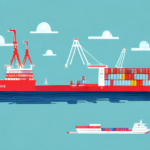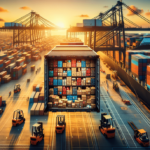Jeff Bezos' Final Farewell: Suez Drama Continues with Historic Alibaba Fine
On March 30, 2021, the world watched in disbelief as one of the largest container ships in the world, the Ever Given, became lodged in the Suez Canal. The blockage created a traffic jam of epic proportions, with over 400 ships waiting to pass through the waterway. The impact on global trade was immediate and significant, with billions of dollars of goods stranded and delays that could take weeks to resolve.
Understanding the Suez Canal Blockage and Its Impact on Global Trade
The Suez Canal is a 120-mile waterway through Egypt that connects the Mediterranean Sea to the Red Sea, serving as a crucial artery for global commerce. The Ever Given incident underscored the canal's pivotal role, accounting for approximately 12% of global trade by volume. The blockage resulted in an estimated $9.6 billion daily loss in global GDP, highlighting the fragility of the global supply chain.
This event shed light on the concentrated nature of global shipping routes and raised concerns about the vulnerability of international trade infrastructures. Additionally, it emphasized the importance of technological advancements such as satellite tracking and real-time monitoring in managing and mitigating such disruptions.
Environmental implications were also a significant concern. The Ever Given was carrying over 18,000 containers, many of which contained non-essential goods. The emissions from the halted ship and the potential for increased carbon footprint due to rerouted ships have fueled discussions on the sustainability of current global trade practices. Experts advocate for more localized supply chains and greener shipping alternatives to mitigate these environmental impacts.
How Jeff Bezos' Legacy Impacted Amazon's Success and Growth
In July 2021, Jeff Bezos stepped down as CEO of Amazon after 27 years, transitioning to the role of Executive Chair. Under his leadership, Amazon grew from an online bookstore into a global e-commerce powerhouse with a market capitalization exceeding $1.6 trillion. Bezos' strategic vision, customer-centric approach, and willingness to embrace innovation were pivotal to Amazon's meteoric rise.
Bezos championed a culture of experimentation and data-driven decision-making. His emphasis on metrics allowed Amazon to optimize its operations continuously, leading to efficiencies that set industry standards. This approach not only facilitated rapid scaling but also ensured that Amazon remained responsive to market changes and consumer needs.
Furthermore, Bezos' investment in technology, including artificial intelligence and logistics automation, positioned Amazon at the forefront of e-commerce innovation. His legacy continues to influence Amazon's strategic directions, ensuring the company's sustained dominance in the market.
The Untold Story Behind Jeff Bezos' Departure from Amazon
While Jeff Bezos' departure marked the end of an era at Amazon, it was not without controversy. Reports of intense work cultures, concerns over labor practices, and accusations of anti-competitive behavior have tarnished Amazon's reputation. Issues such as warehouse working conditions, characterized by long hours and demanding productivity targets, have led to widespread protests and calls for reform.
Bezos' growing focus on his aerospace company, Blue Origin, and his personal endeavors may have influenced his decision to step down. However, his continued influence as Executive Chair suggests that his strategic vision will still shape Amazon's future.
The transition period has raised questions about Amazon's ability to maintain its innovative edge and navigate regulatory challenges without Bezos at the helm. Leadership under Andy Jassy, the new CEO, will be crucial in determining Amazon's trajectory in a post-Bezos era.
Alibaba's Record-Breaking Fine: What It Means for China's Tech Giants
In a landmark decision, the Chinese government imposed a record-breaking fine of $2.8 billion on Alibaba in late 2023 for anti-monopoly violations. This action is part of a broader regulatory crackdown on China's tech industry, aiming to curb the monopolistic practices that threaten fair competition.
The fine reflects the government's increasing willingness to enforce antitrust laws and regulate large tech conglomerates. Alibaba, once lauded for its innovative e-commerce platform, now faces heightened scrutiny alongside other giants like Tencent and Meituan. These measures are intended to prevent market dominance that stifles smaller competitors and hinders consumer choice.
Experts warn that while these regulations aim to create a more balanced market, they may also deter foreign investment and slow down technological innovation. The government's delicate balance between regulation and encouraging growth will significantly influence China's position in the global tech landscape.
For more details, refer to the official [Alibaba Regulatory Report](https://www.shipscience.com/alibaba-regulatory-report/) and [China's Tech Regulation Overview](https://www.shipscience.com/china-tech-regulation/).
The Future of E-commerce in a Post-Bezos World
The departure of Jeff Bezos and the intensified regulatory environment pose significant questions about the future of e-commerce. The pandemic accelerated the shift towards online shopping, emphasizing the need for resilient and efficient supply chains. As e-commerce continues to evolve, companies must navigate challenges such as rising operational costs, cybersecurity threats, and changing consumer preferences.
Balancing profitability with ethical responsibilities will be paramount. Companies are increasingly held accountable for their environmental impact, labor practices, and data privacy measures. Embracing sustainable practices and transparent operations can provide a competitive advantage in an increasingly conscientious market.
Moreover, technological innovations like artificial intelligence, augmented reality, and blockchain are set to revolutionize the e-commerce landscape, offering personalized shopping experiences and enhancing operational efficiencies.
Exploring Jeff Bezos' Entrepreneurial Journey and His Rise to Fame
From his early days as a computer science graduate with a passion for technology, Jeff Bezos embarked on a journey that would transform global commerce. Founded in 1994, Amazon started as an online bookstore, quickly expanding into various product categories and services.
Bezos' relentless pursuit of innovation and his focus on long-term growth over short-term profits set Amazon apart from its competitors. Initiatives such as Amazon Web Services (AWS), Kindle, and Amazon Prime exemplify his commitment to diversifying Amazon's offerings and staying ahead of market trends.
His entrepreneurial spirit and strategic foresight have inspired countless business leaders and startups worldwide, solidifying his legacy as one of the most influential entrepreneurs of the 21st century.
Alibaba's Troubles: Examining the Company's Legal Woes and Regulatory Scrutiny
Alibaba's recent challenges reflect the broader difficulties faced by tech companies operating in China. The company's dominance in e-commerce has attracted significant regulatory attention, with the Chinese government implementing stricter antitrust laws and data privacy regulations.
Legal battles over issues such as unfair competition, data security, and market monopolization have forced Alibaba to rethink its business strategies. The imposed fines and operational restrictions serve as lessons for other companies navigating the complex regulatory landscape in China.
Despite these challenges, Alibaba continues to invest in emerging technologies like cloud computing and artificial intelligence, aiming to sustain its market presence and drive future growth.
The Race for Supremacy: Amazon vs Alibaba in the Global E-commerce Market
The rivalry between Amazon and Alibaba represents a significant chapter in the global e-commerce arena. Amazon holds a dominant position in the United States and expanding markets like Europe and North America, while Alibaba continues to lead in China and other Asian markets.
Both corporations are diversifying their portfolios; Amazon with its ventures into entertainment and logistics, and Alibaba with its emphasis on cloud services and international expansion. This competition drives innovation, benefiting consumers through improved services and competitive pricing.
However, regulatory pressures and geopolitical tensions pose challenges to their global ambitions. Navigating these complexities will determine the future landscape of global e-commerce dominance.
Jeff Bezos' Visionary Leadership Style and Its Impact on Amazon's Culture
Jeff Bezos instilled a unique leadership culture at Amazon, characterized by innovation, customer obsession, and data-driven decision-making. His "Day One" philosophy emphasized maintaining a startup mentality, fostering agility and continual reinvention within the organization.
The implementation of the "two-pizza team" structure promoted small, autonomous teams to enhance collaboration and efficiency. This approach not only accelerated project timelines but also encouraged creative problem-solving.
Bezos' leadership has left an indelible mark on Amazon's corporate culture, ensuring that the company remains at the forefront of technological advancements and market responsiveness.
The Role of Technology in Transforming the Retail Industry: Lessons from Jeff Bezos
Under Jeff Bezos' leadership, Amazon harnessed cutting-edge technologies to revolutionize the retail industry. The integration of artificial intelligence and machine learning optimized inventory management, personalized customer experiences, and streamlined logistics.
Technologies such as Amazon Go's cashier-less stores and the widespread use of drones for delivery exemplify the transformative impact of innovation on traditional retail models. These advancements not only enhance efficiency but also redefine consumer expectations.
Other retailers can draw lessons from Amazon's technology-driven approach by investing in automation, embracing data analytics, and prioritizing customer-centric innovations to stay competitive in the evolving market landscape.
Alibaba's Challenges and Opportunities: A Look into China's Evolving Business Landscape
Alibaba operates within a rapidly changing Chinese business environment, marked by stringent regulations and a dynamic market. The company's ability to adapt to regulatory changes while capitalizing on emerging opportunities is crucial for its sustained success.
Opportunities lie in China's expanding middle class, increasing digitalization, and the government's push for technological self-sufficiency. Alibaba's investments in cloud computing, digital payments through Alipay, and international expansions position it well to leverage these trends.
However, challenges such as regulatory compliance, heightened competition from domestic and international players, and geopolitical tensions require strategic agility and robust risk management to navigate effectively.
The Legacy of Jeff Bezos: Lessons for Aspiring Entrepreneurs
Jeff Bezos' journey from a small online bookstore to leading one of the world's most valuable companies offers valuable lessons for entrepreneurs. Key takeaways include the importance of customer obsession, willingness to take calculated risks, and the relentless pursuit of innovation.
Bezos' focus on long-term growth over short-term gains encourages entrepreneurs to prioritize sustainable business models and invest in future-oriented technologies. Additionally, his emphasis on data-driven strategies underscores the value of leveraging analytics to inform decision-making.
Aspiring entrepreneurs can draw inspiration from Bezos' resilience, strategic foresight, and commitment to excellence, fostering a mindset geared towards achieving transformative success.
Breaking Down the Suez Canal Crisis: Who is Responsible and What Happens Next?
The Suez Canal crisis brought to light the intricate dynamics of global maritime operations. Preliminary reports suggest that extreme weather conditions, including high winds and a sandstorm, contributed to the Ever Given's grounding. However, questions regarding the ship's size, maneuverability, and adherence to safety protocols remain unresolved.
Investigations are underway to determine liability and assess the adequacy of existing maritime regulations. The incident has prompted discussions on updating safety standards and enhancing the canal's infrastructure to prevent future blockages.
Moving forward, stakeholders are focusing on improving coordination between shipping companies, port authorities, and regulatory bodies to ensure the resilience of critical trade routes.
How Alibaba Plans to Bounce Back from Its Recent Troubles
In response to the hefty fines and regulatory scrutiny, Alibaba has outlined a comprehensive strategy to address compliance issues and rebuild its corporate governance framework. Key initiatives include:
- Enhanced Compliance Programs: Implementing stricter internal controls and compliance training to ensure adherence to antitrust laws and data privacy regulations.
- Corporate Restructuring: Streamlining business operations to increase transparency and reduce overlapping services that may trigger regulatory concerns.
- Investment in Technology: Continuing to invest in cloud computing, artificial intelligence, and logistics to maintain competitive advantage and drive innovation.
These measures aim to restore investor confidence and demonstrate Alibaba's commitment to fair competition and sustainable growth. By addressing regulatory challenges head-on, Alibaba seeks to solidify its position in the global e-commerce market.
The company's proactive approach in navigating these challenges will be critical in determining its long-term resilience and market standing.
Conclusion
The intertwined narratives of the Suez Canal blockage, Jeff Bezos' departure from Amazon, and Alibaba's regulatory struggles highlight the complexities of today's global business environment. These events underscore the importance of robust supply chains, visionary leadership, and adaptive strategies in navigating an ever-evolving market landscape.
As companies like Amazon and Alibaba continue to shape the future of e-commerce and global trade, their responses to challenges and their ability to innovate will serve as benchmarks for others in the industry. Embracing sustainable practices, leveraging technology, and maintaining ethical standards will be essential for sustained success and positive societal impact.




















